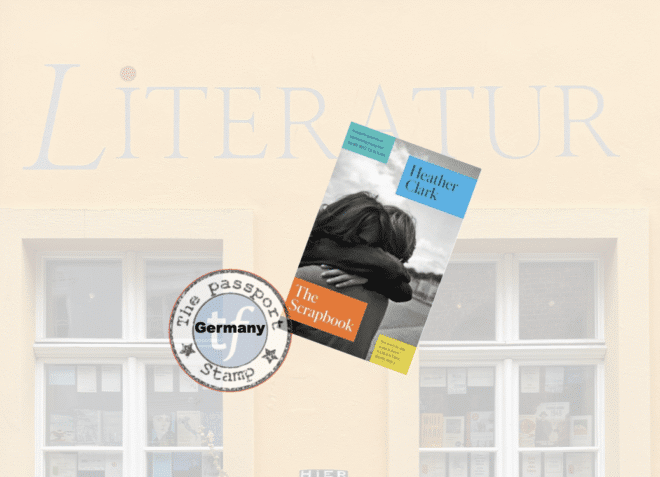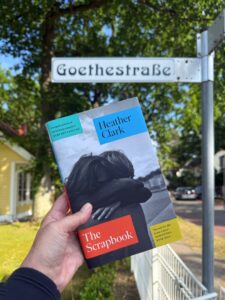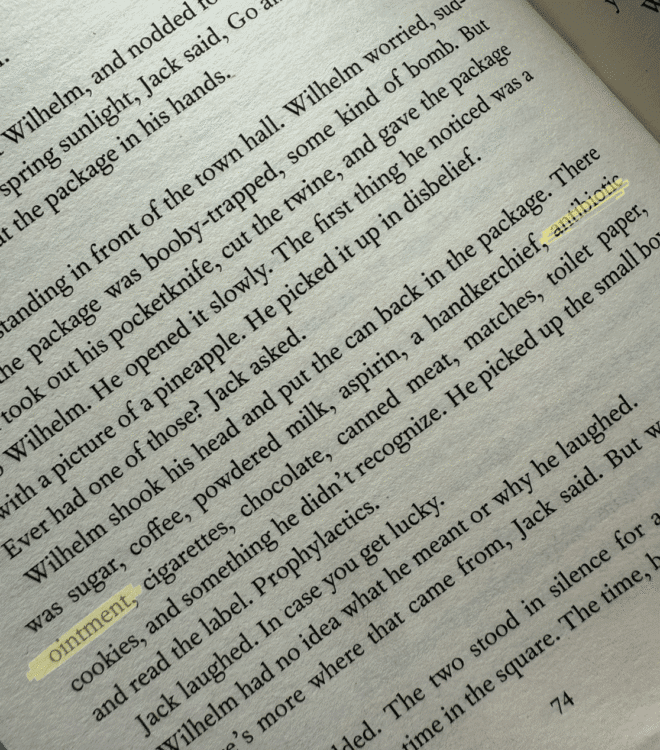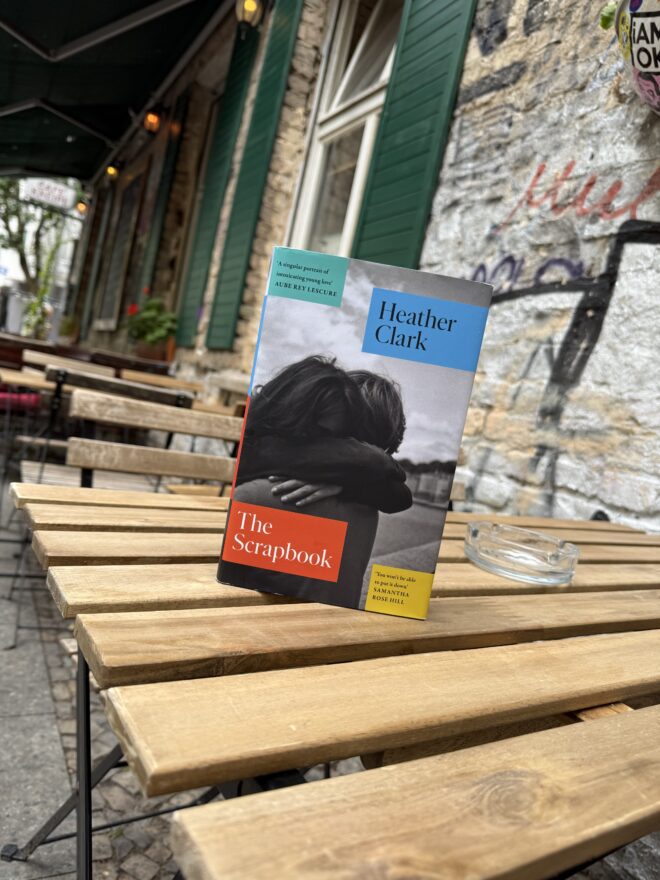Lead Review (The Scrapbook)
- Book: The Scrapbook
- Location: Cambridge (Massachusetts), Germany
- Author: Heather Clark

1996: Anna, an American, is aware of her Grandfather’s history, that he was one of the first Americans to enter Hitler’s Eagle’s Nest, he looted a large Nazi flag from the property, bundled it up and now, it has been an almost forgotten item in the family’s archive back in the States. At Harvard Anna meets Christoph, a German, and is drawn to him, so much so that she follows him to Bavaria via a Summer placement in Switzerland. But theirs is a sporadic relationship, carried out over a good year. He seems unwilling to return to the States, where Anna’s Jewish housemates struggle to contain their animosity towards him because he is German. Thus, the couple has brief trysts in Germany, with long spells apart. In Germany, Anna feels she has the opportunity to probe his family’s past, always pushing to ascertain details of his grandparents’ role in WW2, set against her own grandfather’s role as an American GI, who entered Dachau just after it was liberated, followed by his entry into the Eagle’s Nest in Berchtesgaden.
This story is inspired by the author’s discovery of a scrapbook which her own grandfather had kept and the American GI in the story is inspired by him and his experiences.
The author writes well and this coming-of-age novel has an interesting premise. The couple visits several places across Germany, mostly with pronounced links to WW2; this gives Anna the opportunity to continue her relentless drilling into his family’s past. Each new adventure inevitably circles back to the default setting of WW2 and, after a while, this feels like quite a forced device. Issues of shame, individual/collective culpability and national guilt are fleetingly addressed time and again, and the question is raised of how much the individual in modern Germany (in 1996, that is) should spend contemplating the past. The debate around atonement becomes quite the Leitmotif.
The individual characters of Anna and Christoph aren’t particularly well developed and the relationship hasn’t been sufficiently deeply set by Chapter 3 (p21), so it is a surprise when Anna muses “I was becoming tired of Christoph’s moods“. Yes, he has been inattentive at times but there really wasn’t enough depth for the reader to warrant such an observation. In psychological terms Christoph seems to have an avoidant personality and Anna’s flatmates keep warning her off him.
been sufficiently deeply set by Chapter 3 (p21), so it is a surprise when Anna muses “I was becoming tired of Christoph’s moods“. Yes, he has been inattentive at times but there really wasn’t enough depth for the reader to warrant such an observation. In psychological terms Christoph seems to have an avoidant personality and Anna’s flatmates keep warning her off him.
They travel to Nuremberg, where she is regaled with the story of Kaspar Hauser (which possibly felt like padding), they visit the Dürer house and the Palace of Justice, where the Nazi trials were held. Generally, as they travel around, there is a nice sense of Germany as a backdrop.
On one visit, they travel the 4 hours to Hamburg by train (just after Anna has arrived into Frankfurt from America) and they arrive for a late lunch (it would have to be very late, I think), they then visit the city, they go to the St Nikolai Memorial and then have dinner with Christoph’s parents, and only then head out to the Christmas Markets (which tend to close on the early side each day). The activities on this particular day felt impossibly crammed into what felt like an unrealistic timescale and I couldn’t get my head around the timeline. It was at this point that I felt a firm editing hand needed to intervene, especially as there were certain German words throughout the text that appeared with capital letters, but others nouns were left in lower case (which should have been upper case) like lebkuchen, weissbier.
 In one of the flashbacks to the end of WW2, the author describes a package being handed by an American to a German, which included antibiotic ointment; that, however, wasn’t developed until the mid 1950s.
In one of the flashbacks to the end of WW2, the author describes a package being handed by an American to a German, which included antibiotic ointment; that, however, wasn’t developed until the mid 1950s.
The story is written without speech marks, which on the one hand makes it a bit hard to read as conversations cross into description and it can take a couple of moments to figure out who is speaking; on the other, perhaps. it is a deliberate ploy to echo the confusion about the war legacy happening in the minds of the protagonists.
I took this novel with me to Germany, where I read it and I felt this was quite an engaging novel – well written, for sure – but it was overly contrived. It obliquely tackles the big issues of the legacy of Germany’s role in WW2 and the country’s developing national identity. It then balances these factors against Anna’s heavy-handed deep-dive into Christoph’s family, which made the narrative feel unwieldy. The text is peppered with literary references, which clearly is the author’s forte.
Overall the story was interesting but didn’t hang together, it felt like the author tinkered with the massive subject of German successional/collective guilt and Vergangenheitsbewältigung (coming to terms with and addressing the past) but when the going got tough, the focus switched to the couple dynamics, so it never really went anywhere.
successional/collective guilt and Vergangenheitsbewältigung (coming to terms with and addressing the past) but when the going got tough, the focus switched to the couple dynamics, so it never really went anywhere.

 Please wait...
Please wait...
